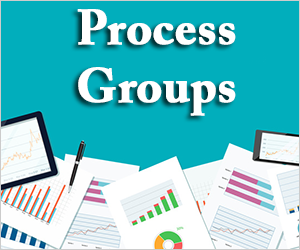
Process groups form the foundation for project management theory. Projects generally proceed through five distinct phases. Each of these phases is called a process group, in fact, I call them “phases” in most of my writing on this site because they all occur in chronological order except for one.
In the Project Management Body of Knowledge (PMBOK), the process groups form the master framework within which all the other knowledge areas rest. The process groups are:
Project Initiation
This process group includes the basic groundwork necessary to create the project and define the guidelines and criteria under which it will operate. Authorizations from the performing organization are given and funding is put in place. An initial scope statement can be made, because executives generally have an idea what the project should accomplish when they authorize it. Any initial project boundaries are determined and stakeholders identified. All of this information is placed into a document called the project charter.
This phase produces a document called a Project Charter. This document contains the relevant project authorization and funding information, as well as scope statements and the like, to get the project going.
Project Planning
Upon authorization of the project, the project must be planned. This phase is usually the most underrated and underutilized. Planning is the most intense part of the project management process, because a lack of planning can result in cost and schedule overruns, as well as other project changes which look bad on the project manager and sponsor. Because of the potential for problems, it is important that the project manager carefully follows each item in the knowledge areas for the project planning phase.
This phase produces a document called a Project Management Plan. This is the master planning document which establishes stakeholder expectations and makes it clear how the project will be managed. In the PMBOK, all ten knowledge areas are well served within the planning phase. It should outline the project’s scope, cost, deadlines, milestones, communication needs, and anything else that shows the stakeholders how the project will be managed. It is highly specific to individual industries and organizations. It should be distributed to the major project stakeholders, including the project sponsor.
Project Execution
The execution of the project requires coordination of human resources, managing stakeholder expectations, and dealing with project changes. The project manager must be on top of issues that arise, as well as making regular forecasts of future schedule and cost problems to deal with changes as far in advance as possible. Change requests must be handled and documented throughout this phase, and stakeholders must be kept informed.
During the project execution phase, most of the technical work gets done. Status updates and other project communications are sent to the relevant stakeholders according to the project management plan. Documents are stored and archived, and stakeholders are managed according to the plan.
Monitoring and Controlling
Throughout the project, the project manager must monitor and control the project work to ensure that project deliverables are on time, on budget and of acceptable quality. Also, stakeholders must be kept satisfied and the project team must be kept motivated and coherent. Monitoring and Controlling the project work occurs concurrently to the Execution phase, therefore the two Process Groups occur in parallel.
Tracking of time (deadlines, milestones, etc.) and cost are most commonly done via Earned Value Analysis, which provides a strong early warning of deviations in those areas. Quality of deliverables, stakeholder communication, and high risk potential problems are other areas of regular monitoring. At any time, monitoring can result in changes to the project.
If changes are required to any part of the project as documented in the project management plan, they need to be documented and result in an updated plan. This includes changes to deadlines, costs, deliverables, and any other change to the project as envisioned.
Project Closing
As underrated phases go, Closing comes in a close second to Planning. There are almost always a handful of tasks involved in closing the project and moving on, and they are usually high on the visibility scale to executives and project sponsors. Contractual obligations must be completed and contracts closed, final details submitted, and funding requirements finalized.
